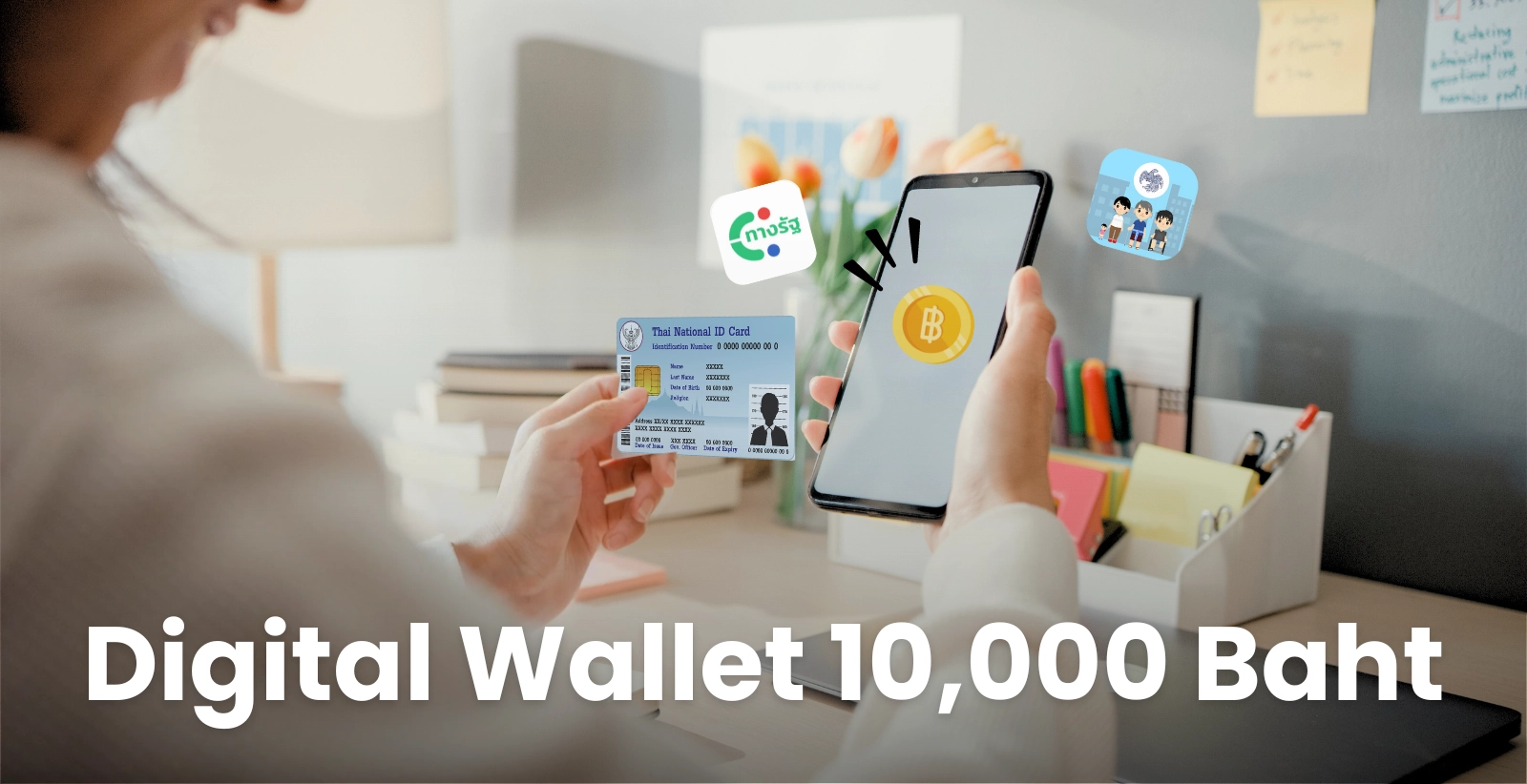What you need to know about digital wallet 10,000 baht

The Thai government’s digital wallet scheme, set to distribute 10,000 baht to eligible citizens, aims to stimulate the economy and ease the cost of living burden. As reported by Thailand’s Public Relations Department, the initiative targets Thais aged 16 and above with specific income and savings criteria, allowing them to spend the digital currency at local participating businesses across 878 districts.
Who is eligible for a digital wallet 10,000 baht
To qualify for Thailand’s digital wallet scheme, you need to be a Thai citizen, at least 16 years old by September 30, 2024. Your yearly income should be less than 840,000 baht (around $23,000), and you shouldn’t have more than 500,000 baht in your bank accounts by March 31. This includes current, savings, and fixed-deposit accounts, but it doesn’t count things like state bank savings lotteries or foreign currency deposits.
Thai citizenship and residency required
- Age 16 or older by September 30, 2024
- Annual income not exceeding 840,000 baht
- Maximum deposit account balance of 500,000 baht
- Not serving a prison sentence
Impact on local economies
The digital wallet scheme is expected to give a good boost to local economies in Thailand. Experts think putting 450 billion baht into the hands of over 40 million people could increase the GDP by 0.33 to 0.6 percentage points in the short term. That’s about 33 to 60 satang for every baht given out. The six-month spending limit and rules about spending locally are meant to keep the money flowing within communities, which should help local businesses.
That said, the impact might not be as big as first thought. Some economists predict the GDP boost could be closer to just 0.4 to 0.7%. There are also worries about how sustainable this boost is, and whether even bigger stimulus plans will be needed down the line. The scheme’s success will depend on things like how many vendors sign up, how well the digital divide is handled, and keeping an eye on inflation.
Handout phases
The Thai government is implementing its digital wallet handout scheme in phases, with the first phase targeting vulnerable groups. On September 25, 2024, the government launched the initial distribution of 10,000 baht to approximately 14.2 million people, including state welfare cardholders and those with disabilities. This first phase aims to disburse 140 billion baht to boost domestic spending and support the local economy.
The second phase of the handout, originally intended to reach a broader population, is facing delays and may not be implemented in 2024. Finance Minister Pichai Chunhavajira has indicated that careful consideration of timing and continuity is needed before proceeding with the next phase. The government is exploring alternative options for the remaining funds, such as investing in small-scale infrastructure projects to strengthen the nation’s economy.

What can the first group use 10,000 baht for
The Thai government’s 10,000 baht handout for vulnerable groups has no restrictions of what you can purchase. According to the Ministry of Finance, they believe that these groups have no tendency for the wrong use of money. What they most likely pay for are just basic consumer goods like:
- Daily necessities such as food, household items, and clothing
- Healthcare expenses, including medication and medical supplies
- Utility bills and basic living expenses
- Local transportation fares
The funds are being distributed through the current welfare card system, making it easier to roll out and keep track of everything. Even though the digital wallet scheme faced some possible delays, the government made sure cash got to vulnerable groups first to provide timely support. This approach focusses on helping those who need it most while keeping things simple. By directing the money toward local businesses and essential services, the goal is to create a ripple effect in the community, hopefully sparking more economic activity beyond just the 10,000 baht each person receives.
Is there any other way to check eligibility
Yes. While the Thang Rath app is the primary platform for digital wallet registration, the Thai government has provided alternative methods for citizens to check their eligibility and register for the scheme:
- 7-Eleven service counters: Individuals can verify their eligibility at participating 7-Eleven stores nationwide.
- Thai Post counters: Post offices offer eligibility checks and registration services.
- Boonterm kiosks: These multi-purpose kiosks allow users to check their status and register.
- Government service kiosks: Dedicated kiosks have been set up for digital wallet-related services.
- ThaID app: This app provides an additional digital option for identity verification and eligibility checks.
The government is developing alternative registration methods for those without smartphones. These include using one-time passwords for basic phone users and national ID card-based registration for those without mobile phones. These diverse options aim to ensure widespread accessibility to the digital wallet scheme across different demographics.
Rath Jai application
The “Rath Jai” application is a new channel developed by the Comptroller General’s Department, Ministry of Finance. It allows citizens to track the status of welfare payments from the government via smartphone. This app enables users to check their eligibility and monitor payments in various programmes, including the 2024 10,000 baht. Users can conveniently view details of their welfare payments, the payment calendar, and the status of fund transfers. Registration and identity verification are required before using the app. It is available for download on both the App Store and Google Play Store.
To register and use the Rath Jai (รัฐจ่าย) app, follow these steps:
- Open the app and select “Register”
- Enter your 13-digit Thai national ID number
- Provide your mobile phone number and email address
- Create a password for your account
- Verify your identity using the one-time password (OTP) sent to your phone
- Complete the registration by agreeing to the terms and conditions
Once registered, you can use the app to:
- Check your eligibility for various government welfare programmes
- View payment schedules and status updates for benefits
- Access a calendar showing upcoming welfare disbursements
- Receive notifications about new welfare initiatives or changes to existing programmes

Thang Rath application
The Thang Rath app is a government-made platform that helps people access different e-government services, like signing up for the 10,000-baht digital wallet handout. It was created by the Digital Government Development Agency (DGA). After the digital wallet scheme was announced, the number of daily logins jumped from around 50,000-60,000 to 800,000-900,000.
To register and use the Thang Rath app:
- Download the app from official App store, or Play store.
- Complete the identity verification process, which includes facial recognition
- For the digital wallet scheme, registration opened on September 7, 2023, and closed on September 15, 2023
- The app is expected to handle up to 6 million daily logins during peak registration periods
- Users without smartphones can register at designated locations from September 16 to October 15
- For assistance, users can call the 24-hour hotline at 1111
Those who missed the digital money program registration deadline can still register using their national ID card after the government announces the new registration period in October.

FAQs about digital wallet 10,000 baht
When will the funds be distributed?
The government aims to start distributing funds in the fourth quarter of 2024, with spending expected to begin by December.
Can the digital wallet money be withdrawn as cash?
No, the funds cannot be withdrawn as cash. They must be spent at participating local businesses within the recipient's registered district.
What can't the digital wallet money be used for?
The funds cannot be used to purchase "sin" goods (like alcohol and tobacco), fuel, services, or online products.
How long do recipients have to spend the money?
Recipients will have six months to spend the 10,000 baht after it's distributed.
Will there be fraud prevention measures?
Yes, the government plans to set up a committee, including members of the Cyber Crime Investigation Bureau, to prevent fraudulent activities.
What economic impact is expected?
The government estimates the scheme could boost Thailand's GDP by 1.2-1.6%, though some economists project a more modest impact.
Latest Thailand News
Follow The Thaiger on Google News:


























